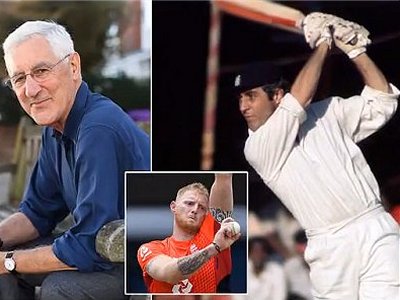
CAN THOSE WHO MINISTER FOR GOD LOSE FORM LIKE A SPORTS PLAYER?
Gerry Rafferty’s famous seventies song Baker Street, with its distinctive saxophone riff, contains the lines:
You used to think that it was so easy
But you’re trying, your trying now
Anyone who has lost form in life will identify with this couplet.
How do sportsmen and women, musicians, poets, actors, surgeons – among any number of professions – suddenly lose the ability to perform at the level they once took for granted? Form is a malleable, ephemeral thing, and once gone, can be as easy to recover as sleep for an insomniac.
One man who struggled with it throughout his sporting career was cricketer Mike Brearley. It is unlikely there has been a better captain of England than Brearley. He had an uncanny ability to get inside the minds of the people he played with, on both sides. The England team he led included some stubborn players – Ian Botham, David Gower and Bob Willis. Brearley was able to get the best out of these strong-willed but unusually talented cricketers and, in 1981, led England to the most remarkable series comeback in the history of the game. But he was barely Test standard as a batsman and never able to inspire confidence in watchers; you just expected him to be dismissed, sooner or later.
Brearley’s sporting career, allied to a subsequent one in psychoanalysis, makes him an ideal candidate to explore the elusive concept of form (‘On Form’ Little, Brown 2018). His contemporary, Greg Chappell said of batting:
The conscious mind can be involved with the big picture stuff such as strategy, but once the bowler approaches, one must trust the subconscious and the years of training to do the rest.
Many will identify with this. Endless hours of practice and learning develop skills which survive in the furnace of action. As the conductor Carlos Kleiber said: ‘with good technique you can forget technique’. Once a secure base of ability has been built, there is greater freedom to improvise.
In exercising ministry for God, the categories look similar on the face of it. There is training for what lies ahead, but there can be no proper simulation of any encounter, and responses must be made in the heat of the moment; the blink of an eye. Sometimes we do not know why we said or did certain things, and end up praying it may be for the best.
But does a minister for God lose ‘form’ and does it matter? The second question may be easier to answer than the first. St Paul says, ‘God chose what is weak in the world to shame the strong’ and ‘when I am weak, then I am strong’. The inadequacy of the follower of Christ does not represent a problem, because ‘our sufficiency is in Christ’. If things go wrong, we know God has an enduring capacity to bring good out of hopeless situations. This is not to encourage negligence and prayerlessness, but to deepen the vision for what might be happening in and around us even as everything goes pear-shaped despite our best intentions. Yet loss of form has its echoes in Christian spirituality and it is, in any case, no fun when the edifice is collapsing around us.
Why are you cast down, O my soul, and why are you disquieted within me? asks the Psalmist.
Sometimes we feel a long way from God for no obvious reason. Even if the spiritual truth may be otherwise, we experience this in a loss of confidence in ministry too. Prayer, pastoral care, teaching, making plans, discerning truth, somehow become harder. It is, in a way, a loss of form and perplexing, as the Psalmist identifies.
After playing an innings at Edgbaston, Brearley once took advice from an old player who said, simply ‘do you think frowning helps you hit the ball harder?’ He pointed out how tense Brearley had become in his face, hands and arms. When a sportsman or woman loses form, the tendency is to over-analyse what has gone wrong and in the act of doing so, to make things worse because improvisation and instinct are surrendered. Everything becomes so laboured.
When ministry becomes more difficult than usual, it is characteristic of the minister to try harder, to re-double their efforts, to concentrate all the more. Often, simply, to work harder. We lose the sense of the Holy Spirit within us and try to take over to make up for this. The instinctual relationship we have with God in us is conceded. The training is still there – we know the stuff – but the glorious sense of God in the moment is waived.
There are no fail-safe paths back to form for professionals, but those ministering for God might want to reflect on Gerry Rafferty. When you’re trying, you might want to try a little less. To be still, and know he is God.
POPULAR ARTICLES

Obama's Covert Wars
The use of drones is going to change warfare out of all recognition in the next decades.

Through A Glass Starkly
Images of traumatic incidents caught on mobile phone can be put to remarkable effect.

What Are British Values?
Is there a British identity and if so, what has shaped the values and institutions that form it?


